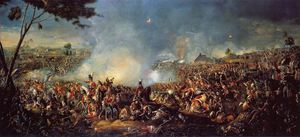shortlisted for Book of the Month
"Little is known about Hildegard’s life after she initially entered the abbey until Jutta’s death. Adams uses that gap in knowledge and creates a detailed and plausible version of her own, enhanced with excellent and accurate details of medieval life"
AMAZON UK
AMAZON US
AMAZON CA
Fictional Drama
12th century
The Rhineland/ Disibod Abbey
In the early 12th century, a young girl was given as a tithe to the church with the intention that she would be enclosed as an anchoress at the abbey of Disibodenberg. That girl was Hildegard, known to history as Hildegard of Bingen. This novel tells the story of her early years at the abbey of Disibod and attempts to fill in a gap in the historical record.
Author PK Adams does a lovely job bringing a young Hildegard to life with her clear and elegant prose. The setting of the medieval Rhineland is well described and gives readers a vivid image of life during the Investiture Controversy. The conflicts brewing between the Church and secular authorities were complex and distressing to people at the time, and Adams captured these emotions plainly in her characters.
I have, at times, railed against authors of historical fiction who take liberties with historical fact for the sake of telling a story. I think if they can’t tell a good story without over-embellishing the facts then they aren’t good storytellers. However, Adams has found a sweet spot with regard to Hildegard’s story, and she’s run with it. Little is known about Hildegard’s life after she initially entered the abbey until Jutta’s death. Adams uses that gap in knowledge and creates a detailed and plausible version of her own, enhanced with excellent and accurate details of medieval life. We may not know about what Hildegard’s life was really like for a number of years, but this novel presents us with a viable option for consideration.
Adams wove in many lyrics from Hildegard’s songs, which was a nice touch. A vital touch, in my opinion. I don’t think one should write about Hildegard without them, given that she wrote so many. I do wish there had been more about herbology, such as recipes she might have used, but that’s just because I am super interested in herbalism. There was enough on that front to appeal to most readers who aren’t as interested as I am, I believe.
The characters are nicely developed overall. I would like more development with Helenger; right now, he just seems like the flat arch-villain, mean just for the sake of being mean. I would also like more development with Volmar, particularly since he played such a large role in Hildegard’s real life. Maybe that will be in book two? The issue with Jutta and her bodily mortification left me a little wanting - I wanted to know more about Hildegard’s thoughts behind it. But overall, these were minor - and possibly personal - issues which didn’t impact my enjoyment of the book as a whole.
I am excited that I don’t have to wait to read the next in the series - thanks, Netgalley! It will be interesting to see how the next book handles the later parts of Hildegard’s much more well-documented life. Hopefully, Adams will continue this remarkable woman's story with the same eye for detail as she has begun it.
© Kristen McQuinn
<previous next >
< You will find several items of interest on the sidebar




























